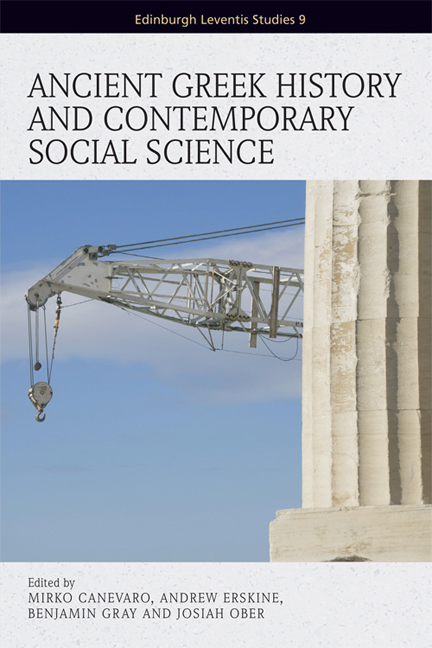12 - Economic (In)Equality and Democracy: The Political Economy of Poverty in Athens
Published online by Cambridge University Press: 06 May 2021
Summary
It is clear … that the political community administered by the mesoi is the best, and that it is possible for those states to be well governed that are of the kind in which the mesoi are numerous, and preferably stronger than both the other two classes, or at all events than one of them, for by throwing in its weight it sways the balance and prevents the opposite extremes from coming into existence. Hence it is the greatest good fortune if the men that have political power possess a moderate and sufficient substance, since where some own a very great deal of property and others none there comes about either an extreme democracy (dêmos eschatos) or an unmixed oligarchy (oligarchia akratos), or a tyranny may result from both of the two extremes, for tyranny springs from both democracy and oligarchy of the most unbridled kind, but much less often from the middle forms of constitution and those near to them.
Aristotle, Politics 4.9.8, 1295b35–96a6From Aristotle down to the present, men have argued that only in a wealthy society in which relatively few citizens lived in real poverty could a situation exist in which the mass of the population could intelligently participate in politics and could develop the self-restraint necessary to avoid succumbing to the appeals of irresponsible demagogues. A society divided between a large impoverished mass and a small favored elite would result either in oligarchy (dictatorial rule of the small upper stratum) or in tyranny (popularly based dictatorship).
Lipset 1960: 50INTRODUCTION
I place these two extracts together in order to investigate how Greek historians and social scientists have explored the relationship between democracy, prosperity and inequality. My aim in this chapter is twofold: first, to outline some of the questions asked within the social science literature, particularly that which draws on this passage of Aristotle, and to see how Greek historians might contribute to, indeed critique, these debates; and second, to use some of the frameworks of this literature to explore Greek history in new ways. By placing these in dialogue with one another, I hope to show not only what social science approaches can offer a Greek historian, but also what Greek history might offer a social scientist.
- Type
- Chapter
- Information
- Ancient Greek History and Contemporary Social Science , pp. 344 - 375Publisher: Edinburgh University PressPrint publication year: 2018



